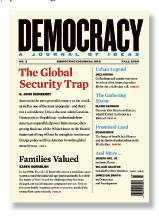
Class of ’94 | “It’s a very different part of your brain that edits a 5,000-word piece on the future of biopolitics, and the part of your brain that in five minutes has to rattle off a sound byte that’s going to be picked up all over the country,” Ken Baer C’94 is saying. The former speechwriter for Al Gore is talking about his newest undertaking, Democracy, a quarterly journal that aims to be an incubator for “big ideas” on the progressive side of the aisle (www.democracyjournal.org).
Baer, who with Andrei Cherny is the journal’s co-editor and co-founder, believes that “new answers and new visions” for a changing world are what the center-left most needs to regain an edge in the voting booth. “We haven’t provided that [and are] basically trying to sell the same stuff over and over again.
“Every campaign is about prescription drugs,” he points out. “And how to improve our schools: ‘Build more and give teachers a raise.’” While that may be necessary, he questions whether it’s enough and whether today’s educational system should still resemble the one that his grandmother attended.
In asking and attempting to answer such questions, one ofDemocracy’s models is The Public Interest, a now-defunct neoconservative journal founded four decades ago by Daniel Patrick Moynihan, Irving Kristol, Nathan Glazer, and Daniel Bell. “They never had more than 10,000 readers,” notes Baer, “and they incubated all these big, transformative ideas on the right, such as supply-side economics, the whole approach to stem cells, and on and on.”
In Democracy’s first issue, an article by Kathryn Roth-Douquet makes the progressive case for military service. “There was a whole series of comments back and forth about whether she was right or not,” Baer says. Another article asks what it means when more Americans work for employee-owned companies than belong to labor unions.
In “The New Biopolitics,” Duke University law professor Jedediah Purdy examines the potentially destabilizing male-baby boom in Asia and baby bust in Europe. “Then he floats an entirely impractical idea for how to get through it,” Baer says approvingly. (Purdy envisions Germany, Italy, and Japan entering contracts with India and China in which the European nations would subsidize education, public health, and other expenses in the developing Asian countries. In return the developing nations would commit a portion of their future Gross Domestic Product to subsidizing the public-pension plans of their investor countries.)
Baer hopes that Democracy’s second issue will spark new debates. “We have a provocative piece about urban renewal,” which essentially argues that a city like Philadelphia “is not going to revive itself by more condos and coffee houses,” he says. “Even though Center City and West Philly are much more livable, if you look at the city as a whole, it’s still on the skids, according to the metrics of poverty and job growth.”
Baer sharpened his pencil as the editorial-page editor of The Daily Pennsylvanian during the Water Buffalo controversy that garnered national headlines and added a few detours to then-Penn President Sheldon Hackney’s confirmation as chair of the National Endowment for the Humanities. “I remember those days clearly, and they taught me a lot about free speech,” he says.
As an undergraduate he also worked as a research director for the campaign of former U.S. Rep. Marjorie Margolies-Mezvinsky CW’63. He did his doctoral work at the University of Oxford on a Thouron scholarship, writing about the rise of the “New Democrats” after Clinton’s election (Reinventing Democrats: The Politics of Liberalism from Reagan to Clinton, 2000). Connecting his love of writing and his fascination with politics, Baer went on to become a speechwriter for then-vice president Al Gore and worked as deputy director of speechwriting on Gore’s 2000 presidential campaign.
In 2001 he started his own communications-consulting firm, advising Senator Joseph Lieberman in his 2004 presidential bid as well as other politicians and corporate clients. Though Democracy, as a non-profit, doesn’t advocate for any candidates, Baer says he believes the Democrats’ prospects are better than they’ve been in a long time. (“Big ideas such as Bush’s are wrong, and they’re going to be rejected.”)
He also seems optimistic about the journal’s prospects. Democracy’s arrival has generated ink from New York Times columnist Maureen Dowd and other journalists. It has lined up a prominent editorial committee (including former Labor Secretary Robert Reich, Pulitzer Prize-winning journalist Leslie Gelb, and Harvard government and sociology professor Susan Rice); found writers who are thrilled to have it as a venue for their ideas; and secured a group of generous donors.
“It’s definitely a way to stay intellectually engaged and involved,” Baer says about his work. “I spend time now talking to some of the smartest minds in the country … It’s like having one big graduate seminar.”
It’s a class with viewpoints across the progressive spectrum. “We’re running something very critical of globalization by somebody who’s seen as very much part of the labor left, and we’re also running [pieces] by people who are not from there. We want them all to be talking to each other.
“Hopefully [these articles] will spur debate across the blogosphere or in the op-ed pages,” Baer says. “And maybe one day we’ll look back and say ‘That idea, that whole approach to globalization the party had, came out of our pages.’ That would be a huge success.” —S.F.




